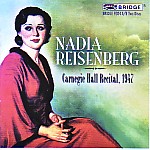Bridge’s reissue of Nadia Reisenberg’s Westminster Chopin recordings included a bonus selection, the B minor sonata from the pianist’s live November 21, 1947 Carnegie Hall concert. I claimed it to be one of the most ardent and committed performances of this warhorse I knew. Bridge now brings us the complete recital, and evidently Reisenberg was hot to trot from the start.
Her secure fingers and innate musical sense breathe life and character into each of the Handel Suite’s movements, and if Mozart’s A minor sonata’s first movement goes too fast for comfort (the audience’s, not Reisenberg’s!), the slow movement more than compensates for its liquid, boldly projected phrasing, flexible yet perfectly proportioned tempo fluctuations, and trills that define definition. She tosses off Weber’s fluffy and pianistically effective Rondo Brilliante with pointed insouciance and just enough roughing up to catch the listener off guard.
The concert’s first half concluded with the aforementioned Chopin, and I’ll simply reiterate (that is, recycle) my earlier comments here for your convenience (and mine!). “The ease and inevitability with which Reisenberg shapes transitions helps her sectionalized treatment of the first movement cohere. The Scherzo’s outer sections fly like the wind with just about every note in place, buttressed by stinging left-hand accents. Tremendous finger power and poise offset Reisenberg’s slightly disconcerting speed-ups and slow downs in the Finale. However, the pianist reaches her expressive peak in a fluid, three-dimensional, gorgeously sung-out Largo.”
The second half’s opener, Barber’s Excursions, gets a spunky, mostly idiomatic treatment, save for the overphrased Blues movement. A few miscalculations (rushed phrases, congested textures, and premature builds) don’t take anything away from Reisenberg’s obvious sympathy for Scriabin’s molten sound world in a set of six etudes. The Stravinsky and Prokofiev etudes and the Khachaturian Toccata are appropriately motoric and steel-fingered, while the limpid, multi-leveled Chopin Nocturne and Tchaikovsky encore ravishingly showcase Reisenberg’s sensitive and achingly poetic side.
Although the quality of the original source material varies in terms of surface scratch, Seth Winner’s fine transfers wring plenty of musical information and tonal realism. However, a few instances of unstable pitch could have been solved, such as the Weber selection’s ever-so-slight drop in pitch as it progresses. Gary Graffman’s wonderful booklet notes paint a smile-inducing lifelike portrait of Reisenberg the friend and colleague.
































